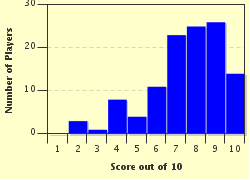Quiz Answer Key and Fun Facts
1. Under what kind of government does India operate?
2. Is India a unitary or federal state?
3. How is the Prime Minister of India elected?
4. India has a bicameral legislature. What are the names of the two houses?
5. To which of these houses are the Indian Prime Minister and his Cabinet directly responsible?
6. Given India's political system and the powerful position of its Prime Minister, how do political theorists refer to India today?
7. Some Supreme Courts have the power to review the laws of the legislature and declare them null and void. Does India's judiciary possess this power?
8. The Office of the Indian Prime Minister was set up in 1947. Who was the first Prime Minister of the Republic?
9. Who was appointed as the first President of the Republic of India?
10. Every country has a supreme law. What is India's supreme law of the land?
Source: Author
Hiyori
This quiz was reviewed by FunTrivia editor
stedman before going online.
Any errors found in FunTrivia content are routinely corrected through our feedback system.


